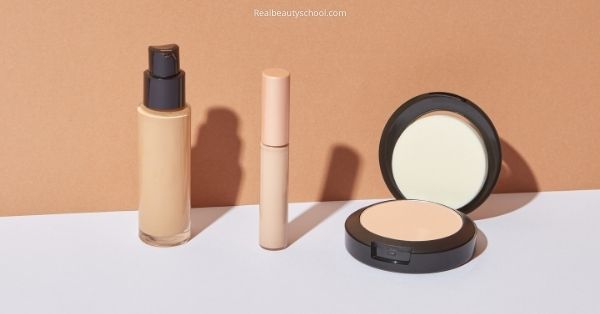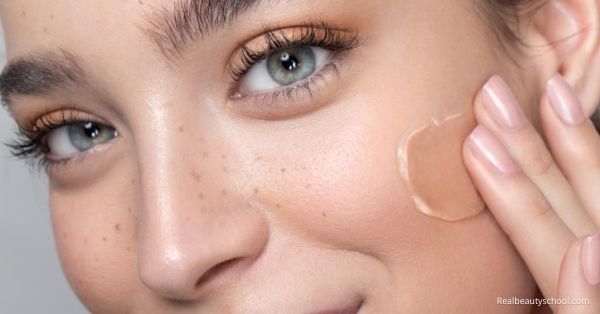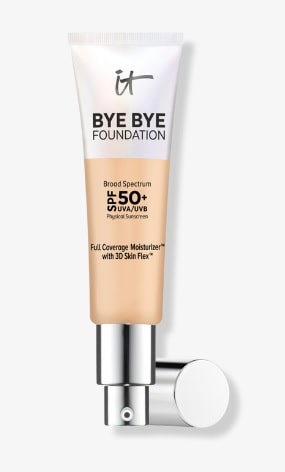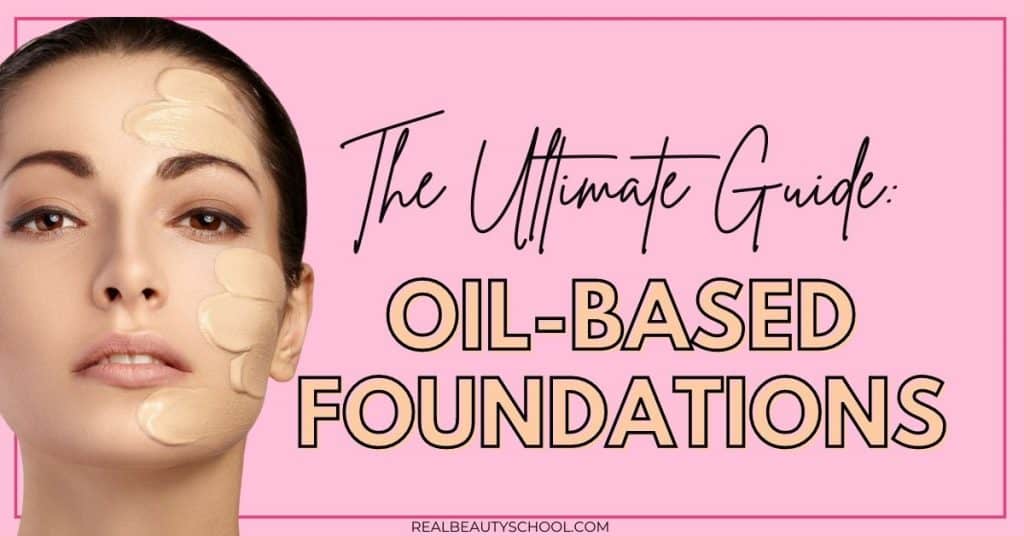As you know, foundation is the “foundation” of your makeup routine. And this crucial step creates a smooth and seamless canvas for you to do the rest of your makeup routine.
However, not all foundations are created equal. In fact, there are three different types of foundations that will either help or hurt your skin that is oil-based, silicone-based and water-based foundations.
If you have never heard of these terms, or you aren’t sure which one is the best for you, then this article was made for you!
Today I will be explaining everything you need to know about oil, silicone, and water-based foundations, which are best for your skin type, and a few of my favorite products.
So if you are ready to revamp your foundation game, keep on reading!
This post may contain affiliate links. That means if you click and buy, I may receive a small commission (at zero cost to you). Please see my full disclosure policy for details.

Difference between a water-based and oil-based foundation
Before we dive into the best oil-based foundations, it is important to know exactly what the difference between water and oil-based foundation is.
The first thing that you need to know is that there are three different types of foundation; oil-based, water-based, and silicone-based (which we will touch on later).
Oil-based foundation means that the base of your foundation is some kind of oil. Typically, this type of foundation will be a bit thicker and can give a little more moisture to your skin throughout the day.
When people hear “oil-based,” many think of a greasy or oily product.
However, if your foundation is oil-based, that does not necessarily mean that it will look greasy.
In fact, an oil-based foundation can actually look quite smooth and matte if applied correctly.
A water-based foundation is the standard type of foundation.
This type of foundation uses water as its base and is thus a little thinner and sometimes runnier.
When it comes to which foundation is the best for you, that is going to largely depend on your skin type.
But before we get into that, you might be wondering, “is my foundation oil or water-based?”
How to know your foundation is oil or water-based
If you grab the foundation you currently own, it is very easy to see if it is oil or water-based.
The best way to find if your foundation is Oil or Water-based is by checking the ingredients list, and if you see an oil (mineral oil, almond oil, paraffin oil, sesame oil, or argan oil are all popular ones) listed as one of the first few ingredients, then your foundation is oil-based.
However, the few oils listed above are not an exhaustive list.
There are many different oils that your foundation might use as its base, so just do a quick scan for the word “oil” to know for sure.
However, that doesn’t answer the question: is my foundation silicone-based?
For that, you still need to check the ingredients list.
Instead of looking for oils, check for these common silicone-based ingredients: Cyclopentasiloxane, Cyclopentasiloxane, dimethicone, and phenyl trimethicone.
These are the most common silicone-based ingredients, but this is not an exhaustive list, so if you don’t see these ingredients, it doesn’t mean for sure that your foundation is not silicone-based.
Every foundation you buy will list water as one of the main ingredients, but that doesn’t mean that it is water-based.
When it comes to determining if your foundation is water-based, it is done by a process of elimination.
If you don’t see an oil or one of the main silicone products near the top of the ingredients list, chances are, your foundation is water-based.
Which is better: oil-based or water-based foundation?

Now that you know the difference between oil-based and water-based foundation, you might be wondering which one is better for you.
As we will talk about more below, this is entirely dependent on your skin type.
Remember, there are 5 different common skin types: oily, dry, sensitive, combination, and normal.
The type of foundation that is best for you is going to greatly depend on the type of skin you have.
Let’s check out exactly what foundation is the best fit for every skin type below.
Is water or silicone-based foundation better for oily skin?

When it comes to oily skin, it is no surprise that an oil-based foundation might not be the best idea.
In general, oily-skinned makeup lovers will want to avoid any products that have excessive oils in them and instead opt for oil-free products.
This is not just for makeup but for skin care as well.
While it may not seem like a big deal at the time of application, an oily foundation mixed with a naturally oily face will create a greasy mess after a few hours of wear.
Instead, I recommend either a water or silicone-based foundation.
When it comes to choosing between the two, I would opt for a silicone-based foundation.
Silicone is perfect for oily skin because it helps to smooth lines and reduces sebum (oil) production.
You can use a water-based foundation as well, and it won’t do any damage to your skin. It just probably won’t help it either.
Water or silicone-based foundation for sensitive skin?

When it comes to sensitive skin, I recommend both a water-based foundation and a water-based primer. Using a water-based foundation is the least likely to cause breakouts or irritation.
However, there is one oil-based foundation that is great for sensitive skin (more on that below).
But when it comes to sensitive skin, there are other factors to keep in mind when deciding on your foundation. I recommend opting for a foundation that is non-comedogenic and hypoallergenic.
This means that it will be free of some harmful chemicals that typically cause irritation in your skin.
Oil or water-based foundation for dry skin?
Dry skin is the perfect opportunity to use an oil-based foundation.
While a water-based foundation will not harm your dry skin, an oil-based foundation will give your dry skin some extra moisture throughout the day.
An oil-based foundation will also give your skin a fresh and dewy glow, which is a big plus!
Oil or water-based foundation for normal skin?
If you have a normal skin type, the type of foundation you use is up to your personal preference. If you have never tried an oil-based foundation before, I recommend giving it a try.
You might find that you prefer it to a water-based or silicone-based foundation.
However, with this skin type, any of these three bases will look good on your skin and won’t make it look greasy or dry it out.
Oil silicone or water-based foundation for combination skin?

Don’t worry, combination skin makeup lovers, I didn’t forget about you!
When it comes to combination skin, your options are a little more open as well.
If you struggle with a larger proportion of oily skin on your face, an oil based foundation might make your face look even more oily.
That is why I recommend a silicone based foundation for combination skin.
This is the safest bet as it will continue to combat the oily parts of your face without drying out your face.
Can You Use an Oil Based Foundation with a Silicone Primer?
When it comes to mixing and matching foundations and primers with different bases, there are times when it can be successful, but most of the time you will want to stay away from this practice.
This reigns true when it comes to an oil based foundation and silicone based primer as well.
The reason that you don’t want to mix the two is because silicone based primers are a bit thicker, and they will protect your skin from whatever foundation you use.
You don’t want an oil based foundation to sit on top of your face without properly blending in, which is what would happen with a silicone based primer.
One thing to note if you want to mix and match your foundation and primer is that there is one combination you absolutely do not want to do.
That is a silicone primer and water based foundation.
The primer will create a silicone barrier, and instead of absorbing the water in the foundation, it will repel it.
This will cause an uneven foundation, just like with the oil based foundation above.
On the flip slide, using a water based primer and silicone based foundation will not cause as drastic of separation, but will not hold very well throughout the day, and will eventually cause a degree of separation.
Best Oil Based Foundation

Now that we’ve covered everything you need to know about the different types of foundation and which is best for your skin type, I want to highlight three of my absolute favorite oil based foundations. Remember, these are perfect for you if you have dry or normal skin.
IT Cosmetics Bye Bye Foundation

This foundation is absolute magic. I love how seamless it is and how it creates a gorgeous and smooth canvas for the rest of your face. Check out a few of the reasons why this foundation is so amazing.
- SPF Too: I love foundations that have SPF in them as well. This foundation in particular has SPF 50, which is much greater than the average foundation. This is perfect throughout the year, but especially great during those sunny days.
- Sparkle but not Shimmer: This foundation is unique in that it is infused with bioluminescence and diamond powder. This gives you a natural sparkle, but does not look like glitter, or an artificial shimmer. Even loyal matte users (and shimmer haters) love this foundation because it gives a natural looking glow.
- Amazing Oils: This foundation also has a few amazing oils that are so good for your face, including argan oil, babassu oil, and orbignya leifera seed oil. All of these work together to make your face look even smoother.
Physician’s Formula: The Healthy Foundation

It’s no surprise that I included that Physician’s Formula on this list because they always have top-of-the-line ingredients and a high-quality formula!
- Healthy Ingredients: This foundation contains sunflower oil, which is a great source of Vitamin E and schinziophyton rautanenii kernel oil, which conditions your skin.
- Great for Sensitive Skin: This foundation is also hypoallergenic and dermatologist-approved, so it is perfect for sensitive skin. While I don’t typically recommend an oil based foundation for sensitive skin, this is one that I am confident sensitive skin makeup lovers would be able to use without any complications.
- Long-Lasting: I love that this foundation stays in place all day long, without fading or smudging.
Alexandra De Markoff Countess Isseryn Liquid Makeup

Out of the three foundations I’ve highlighted, this is definitely the most expensive. Even though it is not a drugstore foundation, it is an amazing and high-quality product that you might want to shell out a few extra dollars for. Check out why below.
- Historically Successful: If you want to try a makeup that has decades of women raving about it, Alexandra De Markoff is the brand to try. This company has been around since the 1930s, and there are so many women who have been using these products for 40+ years. Now that is a makeup brand that you can trust for high-quality products.
- Great Ingredients: This foundation is also formulated with humectants and emollients. These make your skin feel velvety smooth and maintain elasticity and hydration. With these ingredients in mind, this foundation is perfect for mature skin as well!
- Water Resistant: This foundation is also water-resistant, and it is long-lasting. You can feel confident when you apply this foundation in the morning that it will stay in place and in perfect shape all day long.
Conclusion On Oil-based foundation
When it comes to foundation, you want the best fit for you.
Maybe you weren’t sure which foundation base is the best for your skin, but now that you know a few of my favorite oil-based products, I hope you can pick out your next foundation with the confidence of knowing that you are selecting the product that is tailor-made for your beautiful and special face.
What’s Next? Related Foundation Posts:
- Best Foundations for Acne Prone Skin and Oily Skin
- When to apply Foundation vs Concealer: (Complete guide)
- 10 Best Drugstore Non-comedogenic Foundations that won’t clog your pores!
- Here’s why your Foundation looks PATCHY, DRY, or FLAKY and how to FINALLY fix it!
- How to Apply Foundation (Powder, liquid, creams + Complete beginner’s Guide)



